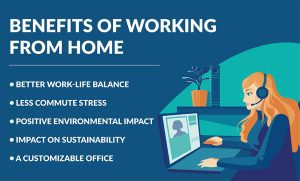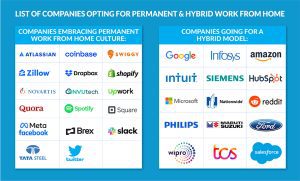
Hybrid work here to stay, but in India, there are some unique issues
Microsoft reports suggest pros and cons of flexi work, need for better logistics and communication, and poses the efficiency question; techies in India reveal bottlenecks in sustaining hybrid work

Work from home (WFH) or remote work became a compulsion during the pandemic, not only in the IT sector but also among white-collar workers in other sectors. Now that the pandemic is almost over, employees are being called back to work from office.
But people are going back to the office all at once. Many firms are still allowing employees to WFH two or three days a week. This flexibility is now widely known as “hybrid work”.
Global technology giant Microsoft periodically conducts surveys on work trends among tech workers in different countries through its research outfit Microsoft Lab and publishes reports of the findings. These are called Microsoft Work Trend Index Pulse Reports. Three such reports till now have been on hybrid work: “The Next Great Disruption is Hybrid Work — Are We Ready?” (March 22, 2021); “Great Expectations: Making Hybrid Work Work” (March 16, 2022); “Hybrid Work is Just Work — Are We Doing It Wrong?” (September 22, 2022).
Lasting transformation
The Federal summarises the main findings of these reports. This article also summarises the feedback received from some employees of tech hubs such as Greater Noida, Hyderabad, Bengaluru and Chennai. The Federal spoke to them about their ground experience in hybrid work.
Also read: TCS’ new 3E model to effectively manage a hybrid workplace. Know more
Hybrid work is not merely about alternating the location of work between home and office. Rather, the work experience of the past two years has brought about a lasting transformation among many employees, fundamentally changing how they define the role of work in their lives. With more and more people experiencing the positives of flexible work, there is no going back to the old routine of total office work.

As a result, many employers have had to yield to the strong aspirations of employees about continuing some flexibility in the work arrangement. Hence, hybrid work seems to be here to stay.
The main findings
The first Microsoft report was based on a study of 30,000 people across 31 countries. The findings said workers sought both work from office and WFH. While 73 per cent wanted flexible remote work option to continue, 67 per cent craved more in-person time with their teams. That duality laid the basis for hybrid work — a combination of remote work and work from office in a certain proportion.

The report suggested that industry leaders are out of touch with their employees and needed a wake-up call. It showed that high productivity was masking an exhausted workforce. Time spent on team meetings had more than doubled, while the average time of meetings was getting longer. An average team member had to engage in more chats with colleagues. The number of emails exchanged increased phenomenally.
But the barrage of communication remained unstructured and mostly unplanned, with 62 per cent of the calls applying pressure on workers to “keep up.”
Also read: Hybrid work makes employees productive, flexible and happy: Cisco study
The second report surveyed 31,000 workers who had already gone through a year of flexi work. The revelations were startling. Fifty-three per cent of the employees attached greater priority to health and well-being compared to remuneration, and 52 per cent of Gen Z and millennials were keen on leaving their current employer and finding a new one.
While reporting at the office at least twice a week was now the order of the day, the new pattern tended to become a mechanical routine, and there seemed to be a communication problem. Thirty-eight per cent of hybrid employees said their biggest challenge was knowing when and why they had to go to office, and only 28 per cent of leaders had team agreements to define those conditions. Besides investing in hardware and software, companies should also invest in fostering a democratic workplace culture, the report urged.
Survey of mass psychology
There is a perceptible change in the tone of the third report. While the first two reports had an “academic” presentation and appeared to be “objective,” the third report was intended not only to report the trends but to overtly shape them as well. While underlining the need to get back to office, it outlined the glitches in current hybrid work.
Surveying 20,000 people across 11 countries, the September 2022 report concluded that months into hybrid work, employers and employees were divided. While 87 per cent of employees felt they were working more and were equally productive at work, 85 per cent of leaders said the “shift to hybrid work (had) made it challenging to have confidence that employees (were) being productive.”
Consciously avoiding actual productivity figures, which Microsoft could have easily collated, the report only suggested that it was challenging for executives to feel employees were being productive. Thus, the third report turns out to be a survey of mass psychology of employees rather than the reality of work trends.
Also read: 34% Indians want to switch jobs, 81% feel remote work feasible: PwC survey
One stark contrast brought out the alienation and distraction employees felt in hybrid work. While the number of meetings per week had increased by 153 per cent, “42% of participants multitask(ed) during meeting by sending an email or ping(ed) or (kept) reading incoming emails or pings or (took) to working on non-meeting files or resort(ed) to web-browsing activity.”
Out of “productivity paranoia”, some companies have deployed technology to track activity, by hour and even by minute, rather than tracking only the outcome. This undermines trust. A communication gap also sets in. Only 43 per cent of employees feel the management solicits their feedback at least once a year, the report suggested.
Seventy-three per cent of those doing hybrid work felt they needed a better reason to go to office than just to meet company expectations or abide by executives’ decisions. Even those going back to office reported that they did so only to socialise with other employees and re-build team bonds. While 56 per cent of employees were hungry for career growth opportunities, 76 per cent aspired to be their own boss. That sums up the basic conflict in the new hybrid work — a more enlightened tech workforce.
Experience of Indian techies
The Federal talked to many IT employees in Greater Noida, Hyderabad, Chennai and Bengaluru. Their feedback in general tallied with some of the findings of the Microsoft surveys on hybrid work. However, these employees also reported a few problems and bottlenecks in sustaining hybrid work which the Microsoft reports did not cover.
Wilson, principal manager in an IT services firm in Hyderabad, said those accustomed to WFH were finding it difficult to go back to office even twice a week. Outstation employees had vacated their Hyderabad accommodation and were finding it difficult to rent rooms again. They grudged paying a huge rent to be in office for only eight days a month.
Local employees found WFH distracting and were keen on returning to office, but not full-time. In contrast, most women employees were happy to be back in office because it gave them some relief from unending household duties.
Also read: Talent migration: 60% employees may quit in 6 months for better work-life balance
However, these facts depend on the type of work one was doing, pointed out Wilson. For instance, those who must meet clients face to face need to be present in the office during working hours.
An unfeasible arrangement for many
Kiran, a techie who resigned from Infosys in Hyderabad two years back to take up independent consultancy work, echoed Wilson’s views. Kiran told The Federal that nearly half of the employees of firms that introduced hybrid work were from Vijayawada, Guntur, or Visakhapatnam. Some even came from metros like Bengaluru or Chennai. They can neither go home nor rent decent accommodation in Hyderabad to work in the office just twice a week. So, WFH for them boils down to work from PG (paying guest) accommodations.
Sourabh Bose, a senior software engineer with a major IT company in Greater Noida, hails from Prayagraj. He said instead of spending ₹20,000 a month on hiring a flat and other paraphernalia, he stays with his sister in Delhi for two days a week and takes the night train to Prayagraj. That’s a night-long commute. He said it was difficult to give a generic answer to questions about employees’ or employers’ preferences on the nature of work and that it might differ from case to case.
Younger employees are quite happy about hybrid work. For example, Surabhi Rastogi, who is in her late 20s and works in a medical firm in Bengaluru, is quite happy doing hybrid work. Though her home is in Nagpur, she has rented a flat in Bengaluru, and finds hybrid work more fun.
“I have time to go shopping, watch films, cook what I like, go to the gym, and even go out on a date. I finish the work at night and have ample time during the day. No one is watching how and when I complete my work. I have to be in office three days a week, and I decide which days those are,” she said.
Also read: Over 60% Indian employees prefer working from office: Survey
Nidhi Sharma, who has a two-year-old child to look after, feels hybrid work is very helpful. However, an NRI working as a sales executive in an Indian IT company in London told The Federal that even WFH should be done professionally, and domestic help should be employed to take care of cooking and children. Otherwise, WFH becomes more strenuous.
The question of commute
Not everyone is unhappy going to the office. A young employee in Pune is fond of going to the office simply because “it has a gym, a swimming pool, a beautiful garden for a brief stroll, and a cafeteria for relaxation.”
A TCS employee in Chennai said work from office was not very productive. “The management has given us a diktat that we should report for duty in office twice or thrice a week. We just go there, meet friends, chat with them, have coffee, come home, and then log in again and resume work. Very little work is done at the office.”
Parimala Panchatcharam, president of the Forum for IT and ITeS Employees (FITE) and a former Infosys employee, told The Federal that spending three to four hours on commuting is a big hassle in Chennai. Employees are not ready to travel daily from Pallavaram to Chengalpattu Mahindra City (36.5 km) and even change jobs for that.
A social worker in Hyderabad said commuting brings down employees’ efficiency and, hence, productivity. After three hours of driving in peak-hour traffic, employees are exhausted and unable to give their best. Even if they work for the same duration at home, their productivity goes up.
While the Microsoft reports have tried to be fair in reporting employees’ feelings, they have missed some crucial problems listed above, which are unique to Indian cities. Corporate leaders must address these problems to make hybrid work sustainable.

